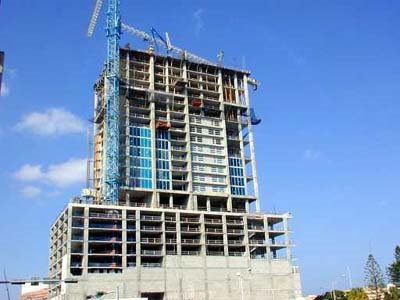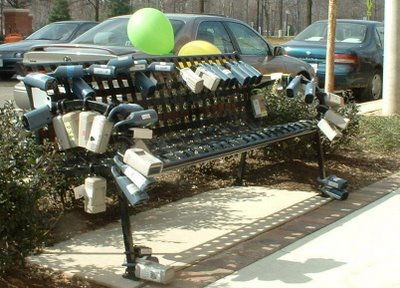Should I invest in a condo?

As I briefly mentioned in my last column, I'm not a fan of investing in condos. I dislike the troubles behind owning them, and I dislike them as an investment. Although there are a few exceptions to the rule, I will probably never own a condo as an investment.
The first set of concerns weigh on all who buy a condo, not just investors. These are the costs of owning a condominium. For starters there is the condo association fee. Most home purchases are part of an association, which tends to all of the common areas My parents pay less than $100 a year for their single family home. Biff and I pay, on average, about $70 a month for each of our town homes. The condo owners I know pay between $200 and $400 a month in condo association fees.
Why so high? For one thing condos have a great deal more common area than single family homes. There are lobbies, offices, exercise rooms and pools, not to mention the common roof. All of these things must be maintained, and the maintenance will climb every year. Unlike the 30-year fixed mortgage that charges you the same amount every year (and therefore decreases every year when adjusted for inflation), condo association fees will rise over time.
But sometimes that association fee isn't enough. If too many repairs hit in too short a time, the condo association can extract that payment from the owners, which can sometimes cost in the tens of thousands of dollars for each owner. This comes in liu of having to pay for repairs to a single family home, by yourself. But with a house you can control the care and the abuse it encounters (to some extent).
Condos are a pain for everyone who owns, but they have even more added pains for investors. Condos (outside of any bubble) tend to appreciate extremely slowly in most areas of the country. There's a very good reason for this. Consider, if you will, this "real estate expert" and his view on why condos are an extremely good investment (as always, emphasis mine, bad grammar theirs):
Sylvia:
Could you explain to me that condo and townhouse and what the benefits are of buying a condo our town house because I am not sure which one to buy for an investment?
Jerry:
One of the advantages of condominiums is that in the future, the growing trend will be as the baby boomers get older, they will be seeking to downsize from what they are currently living in and going into low maintenance structures.
Condominiums are popular and will remain so and grow in popularity in the future. You’ll have to take my word for that. All you have to do is look around and see the growth of condominium developments that are spreading out everywhere. That’s because statistics show that the baby boomer generation as we get older is going to want smaller, easier, affordable, maintenance-free housing.
He's right about one thing. Look around you at the new condominiums springing up all around you. That's your future competition for sale, rent and every other business transaction. Then look around at all the empty space, the old houses that are falling apart and will probably be
 bought by a developer in the next 10 years. That's your competition for sale and rent 10 years from now. Of course, at that point your competition has brand new condos and you just have an old one.
bought by a developer in the next 10 years. That's your competition for sale and rent 10 years from now. Of course, at that point your competition has brand new condos and you just have an old one.Take another look at that plot of land. How many houses do you think could be built there? 10? 25? Against how many condos? 100? 500?
Unlike houses, which are all relatively unique (due largely to the plots of land they are on), condos are all the same. The only thing that is unique to a condo is the view it offers, and that's out of your control. Aside from the view, why would anyone choose your condo over the one two floors higher that's also for sale? What? You didn't realize that no matter when you sell, you'll likely be competing with other people in your same building? During a normal time (not the current crash certain areas are in) you probably won't be selling against 30 owners, but almost always certain to be selling against one or two. And what advantage can you use against them except lower price?(Photo taken from the Bubble Meter, also the source of my previous bubble pic here. All were taken in Northern Virginia)
With a house you can make improvements, maybe finally get around to building that deck. Then when you sell, you can try (or your realtor can try) to convince potential buyers that your house is worth maybe a little more than the one that just sold down the street last month, because yours has "features". Try doing that with a condo. If John Doe down the hall has an emergency and sells in a hurry for $50,000 lower than expected, your buyers are going to look at the comparable and ask "His unit is just down the hall, with the same floorplan. "Why is your place worth $50,000 more?"
But at least you can rent the condo out, right? The answer is a firm maybe. Your fellow condo owners are not fans of investors, those who buy and then rent out. Doing so lowers their property values. From a realtor website (with several other good questions to ask):
What percentage of units is owner-occupied? What percentage is tenant-occupied? Generally, the higher the percentage of owner-occupied units, the more marketable the units will be at resale.The New York Times reports that condo buildings that have too many rented units could have trouble qualifying for mortgages! Try selling a condo when your buyer can't find a bank willing to back the mortgage.
Mortgage brokers and loan officers interviewed stressed that to lend money to the co-op corporation, for the underlying mortgage, or to individuals purchasing co-ops or condominiums when owner-occupancy is below 50 or 60 percent, certain conditions must be met. They explained that without these conditions, the risk of an investor who owns a lot of apartments going bankrupt -- and leaving the co-op in the lurch -- was just too high.As a result, owners in condos are pushing their associations (and rightly so) to limit the number of units avaiable for rent. It is within the rights of the condo association to restrict you, the owner, from renting out your condo. (If you read the link, the answer that the columnist gave the owner is that since his association's By-Laws allow renting, they'd have to amend the By-Laws to pass any rules restricting investors).
So are condos all bad? Of course not, and in some areas of the country they make great investments. Where are those magical areas, you ask? Where there is no land available to build more.
I believe strongly that if you are interested in investing in condos, that you look to urban settings. Chicago, New York, San Fransisco, these are places that don't have any room for more condos. Alternatively, certain amentities, such as oceanfront properties, simply can't be replicated 2 miles inland. In both of these situations, basic economics tells us that if the demand grows, and no one can increase the supply, the price will go up. Buying condos in areas (such as the suburbs around any major city) where developers can add supply by the hundreds simply doesn't make sense.
The problem is that condos in areas like these can go for more than single family homes in most other areas. If you can't afford to buy a condo in those super-hot markets, look elsewhere. Town homes sell well as starter homes (unless in dowtown areas, then they are expensive homes), have no restrictions on renting and many families who can't afford to buy love the space and the yard afforded by a town home. Instead of buying a condo, why not buy an apartment complex? If you look to invest in a college town, look at buying one of those 6-8 unit complexes. No fees (since you control the entire building), no restrictions, and few competitors when buying. And they can often be purchased for less then the price of a condo in one of the major US cities.
Keep all of this in mind the next time you're looking at making that investment. The people who make the most from condos are the developers. And even they lose money sometimes.



